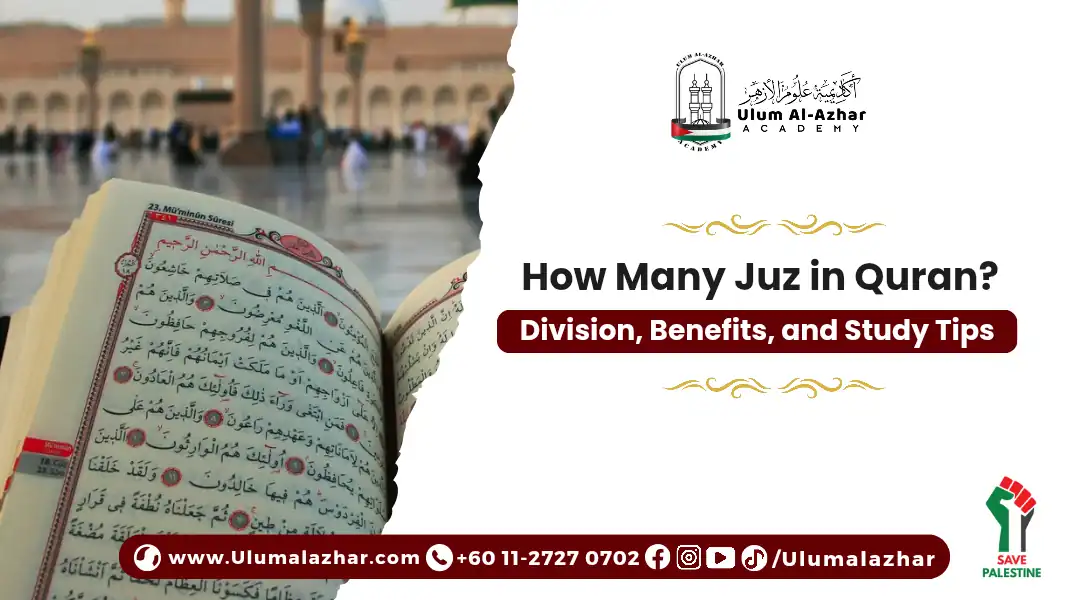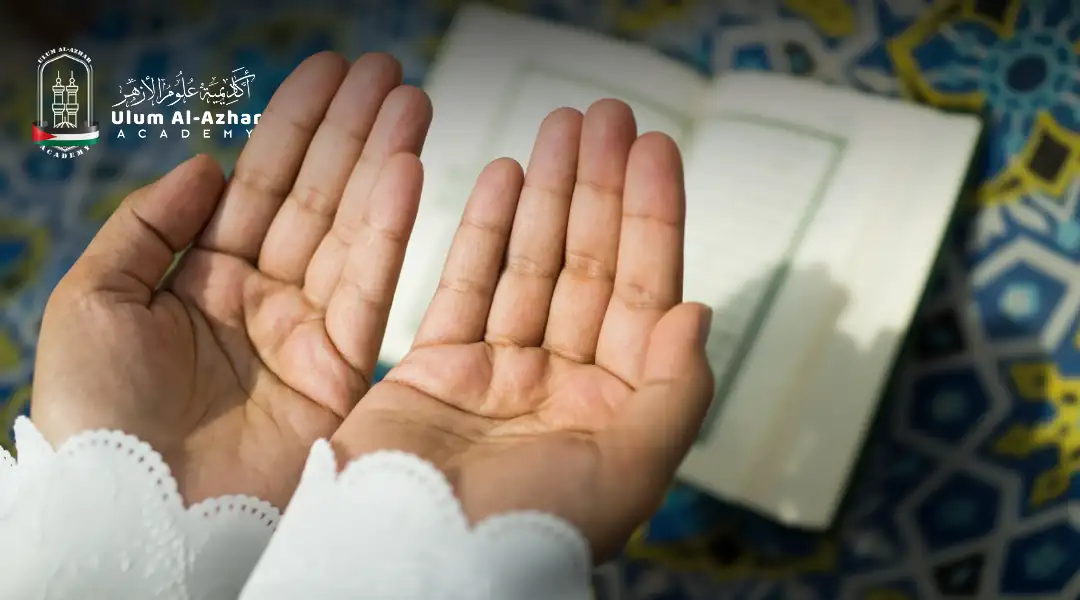
How Many Juz in Quran? Division, Benefits, and Study Tips
How was the Quran divided into parts, and why? The Noble Quran is the final revelation from Allah Almighty revealed to the Prophet Muhammad ﷺ to guide, show mercy, and bring light to everyone. It is the only Book of Allah that has never been, and will never be, altered or distorted. For Muslims, reading, learning, and remembering the Quran is a lifelong journey that helps them get closer to Allah and live according to His plan. Many Muslims, especially those who are just starting, often ask: how many juz in Quran? Knowing how the Quran is divided into juz makes it easier to read, study, and memorize.
These lines will explain what juz means, the reason behind dividing the Quran into juz, how many juz are in Quran, the advantages of this division, ways to plan your study, tips for memorizing, and common questions people have.
Meaning of Juz and Its Purpose
Among the great blessings of Allah upon this Ummah is that He granted it the greatest Book ever revealed to the best of Messengers ﷺ. The Muslim Ummah received this divine gift in the best possible way, and its scholars and reciters spared no effort in serving this noble Book in a manner befitting its lofty status. One of the fruits of this service was what Allah guided the scholars to: dividing the Qur’an in a way that makes its memorization and recitation easier, encourages the reader, and inspires him to do more without fatigue or weariness.
So, how many juz in Quran ? The term juz (plural: ajzaa’) literally means “part” or “portion.” In the Quranic context, it refers to one of the thirty equal divisions of the Quran.The Noble Qur’an was revealed by Allah Almighty already divided into verses and chapters (surahs). While the Prophet ﷺ did not divide the Quran into juz himself, the early Muslim scholars and reciters introduced this division to make recitation and study more organized.
The reason the Quran is divided into juz is for practical use, not for religious reasons. It helps Muslims read a small part each day and finish the whole Quran in a set time, usually a month. This method is especially useful during Ramadan, when Muslims aim to complete one recitation (khatm) of the Quran.
So, when someone asks how many juz are in Quran, the answer isn’t just a number—it shows a long-standing way of making the Quran easier for all Muslims to read and understand.
Get a free consultation session with Al-Azhar-certified Sheikhs from Egypt and kickstart your personalized Islamic studies.

How Many Juz in Quran: The Complete Breakdown
To answer clearly: how many juz in Quran? The Quran consists of 114 chapters (surahs) and over 6,000 verses (ayat). But in terms of juz, the answer is simple: there are 30 juz in the Quran.
Each juz is roughly the same length (almost 20 pages or 10 papers), although not all are exactly equal in terms of verses. This division allows a reciter to complete one juz per day and finish the Quran in one month. Here is a simple breakdown of every juz (note that Each Juz begins with the verse that follows the verse where the previous Juz ended) :
Juz 1: Begins: Al-Fatiha (1:1), Ends: Al-Baqarah (2:141)
Juz 2: Begins: Al-Baqarah (2:142), Ends: Al-Baqarah (2:252)
Juz 3: Ends: Aal-E-Imran (3:92)
Juz 4: Ends: An-Nisa (4:23)
Juz 5: Ends: An-Nisa (4:147)
Juz 6: Ends: Al-Ma’idah (5:81)
Juz 7: Ends: Al-An’am (6:110)
Juz 8: Ends: Al-A’raf (7:87)
Juz 9: Ends: Al-Anfal (8:40)
Juz 10: Ends: At-Tawbah (9:92)
Juz 11: Ends: Hud (11:5)
Juz 12: Ends: Yusuf (12:52)
Juz 13: Ends: Ibrahim (14:52)
Juz 14: Ends: An-Nahl (16:50)
Juz 15: Ends: Al-Kahf (18:74)
Juz 16: Ends: Ta-Ha (20:135)
Juz 17: Ends: Al-Hajj (22:78)
Juz 18: Ends: Al-Furqan (25:20)
Juz 19: Ends: An-Naml (27:55)
Juz 20: Ends: Al-Ankabut (29:45)
Juz 21: Ends: Al-Ahzab (33:30)
Juz 22: Ends: Ya-Sin (36:27)
Juz 23: Ends: Az-Zumar (39:31)
Juz 24: Ends: Fussilat (41:46)
Juz 25: Ends: Al-Jathiyah (45:37)
Juz 26: Ends: Adh-Dhariyat (51:30)
Juz 27: Ends: Al-Hadid (57:29)
Juz 28: Ends: At-Tahrim (66:12)
Juz 29: Ends: Al-Mursalat (77:50)
Juz 30 (Juz Amma): Ends: An-Nas (114:6)

Benefits of Dividing the Quran into 30 Juz
Why we care about knowing how many juz in Quran? The answer lies in the numerous benefits this division brings:
Ease of Recitation: It’s easier to recite the Quran when it’s broken into 30 parts. This way, Muslims can read a small piece every day without feeling too much pressure.This is especially helpful for those with busy lives.
Completion in Ramadan: during Ramadan, many Muslims try to complete the whole Quran. Knowing how many parts there are helps them set a simple plan to recite one part each night for 30 nights.
Also, In many mosques, people come together during taraweeh to pray and recite one juz every night.
Facilitating Memorization: dividing the Quran into 30 parts also makes it easier to hifz (memorize). Students can aim to make a revision of one juz at a time.
Structured Learning: For students in Islamic schools, this system helps them study the Quran in a planned and organized way over weeks or months.
Facilitating Memorization: Dividing the Quran into 30 parts creates a natural framework for hifz (memorization). Students can aim to make a revision of one juz at a time.
Study Plans for Completing the Quran by Juz
Knowing how many juz in Quran is just the first step; the real value comes from using this knowledge in everyday life. Muslims can create study schedules based on the 30 juz. Here are some examples for reading or reflecting :
- 30-Day Plan: Read one juz each day to complete the Quran in a month,like during Ramadan.
- 60-Day Plan: Half a juz daily(one hizb), completing the Quran in two months.
- 5-Months Plan: Read 4 pages each day to complete approximately one juz every 5 days, allowing you to finish the entire Qur’an in about five months.
- 1-Year Plan: Reading just two pages a day (approximately 20 lines) allows completion of the Quran in less than one year.

Memorization Tips Using Juz Divisions
In reality, there is no single method for everyone to memorize the entire Qur’an; it depends on the time and ability of each individual who is memorizing. So if you joined the Best Online Quran Memorization Course you will find:
– Step-by-step guidance for memorizing the whole Quran by heart under the supervision of Al-Azhar Al-Sharif tutors.
– The Course is designed to provide structured and effective methods to help you achieve your goals whether you’re a beginner or want to complete your Quran memorization
– Acquire the ability to recite the Quran with proper Tajweed, as our classes focus on understanding and practicing Tajweed rules.
– Strengthen your connection with Allah by deepening your understanding of Quran.
– Get an endorsed High-Level Ijazah Sanad Muttasil.
– Qualify for studying 10 Qiraat.
We also can’t forget our kids, Online Quran Memorization Course for Kids offers structured and effective methods for children to memorize the Quran.
Conclusion
So, how many juz in Quran? The Quran is split into 30 juz, a way that makes it easier, more organized, and more beautiful to read and remember Allah’s last message. This system helps Muslims read the Quran during Ramadan, learn it gradually, and include it in their everyday lives.
Dividing the Quran into juz shows the balance of Islam: worship that is simple, useful, and inspiring. Whether you’re just starting with Juz ‘Amma or a scholar going through all 30 parts, the juz system is a helpful tool that makes it easier to connect with the Quran.
Discover personalized Islamic learning: begin with a free consultation by Al-Azhar-certified Sheikhs from Egypt.
FAQs
How many juz in Quran exactly?
There are 30 juz in the Quran, each roughly equal in length.
Who divided the Quran into 30 juz?
The division was introduced by early Muslim scholars and reciters for practical purposes, not during the lifetime of the Prophet ﷺ.
Why is Juz ‘Amma special?
Juz ‘Amma (the 30th juz) contains short surahs commonly memorized and recited in prayer, making it especially beloved.
Is it necessary to follow the juz division?
No, it is not a religious obligation. But it is a helpful tool widely used by Muslims around the world.
